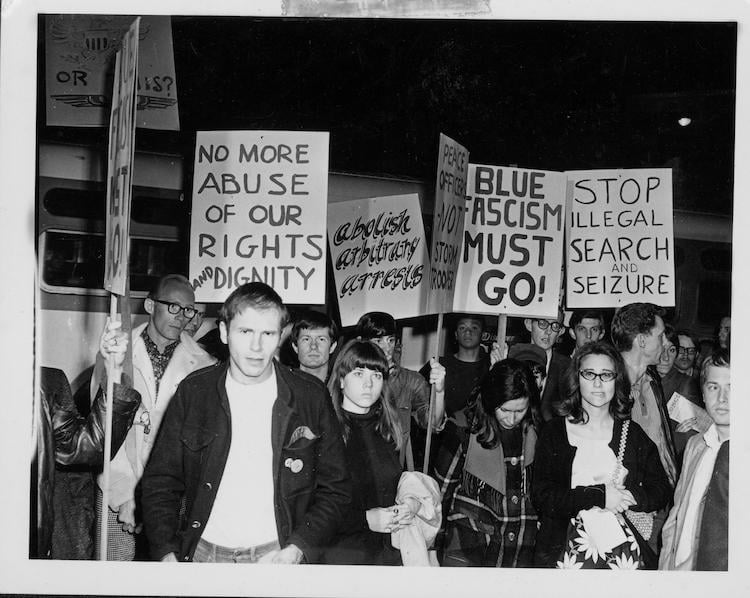
The gay-political activist group PRIDE (Personal Rights in Defense and Education) lead hundreds of people in protest after the Los Angeles Police Department raided the Black Cat bar in the Silver Lake and brutalized patrons and the bartender. Feb. 11, 1967. Photo: ONE Archives at the USC Libraries
The police raid at the Black Cat in Los Angeles, a pre-Stonewall gay landmark, is often cited as the catalyst that led Dick Michaels (real name Richard Mitch), Bill Rand (Bill Rau), and Sam Winston (John Sam Allen) to found The Advocate, but it was not the first raid where Michaels was present. He was also at the equally important Yukon Bar at a raid that occurred almost a year earlier and at which Michaels was arrested on charges for which he later faced trial. Protests followed.
The Yukon, at 3977 Beverly Blvd. in Los Angeles, was a mere 1.8 miles from the Black Cat. Before becoming the Yukon Bar, the building had been a malt shop, a cleaning supplies store, a candy, tobacco, and food delivery store, a fixture store, and a Safeco Insurance office. When Joel Levey bought the property, he was so young he didn’t have enough credit to do so himself, so his father, Rudolph Levey, cosigned with him. After obtaining a liquor license in December 1964, Joel hired a bartender and manager (Tommy) to run the day-to-day. The bar opened with little fanfare in March 1965.
Though it wasn’t specifically a gay bar, the Yukon was known to be gay-friendly or at least gay-tolerant, so it became a frequent stop for the people who would form PRIDE and The Advocate. Tommy was running the bar on Friday, March 25, 1966, when the police arrived.
Told in a two-part story in the July and August 1968 issues of The Advocate, the article “Anatomy of a Raid” was an oral history from Michaels to David S.; the first part recounted the Yukon raid and arrest, while the second told of the trial and aftermath.
Sharing this tale not only illustrated how common these events were but also served to instruct other gay men on how to avoid these situations or, if they were entrapped, provided instruction on how to navigate the process of arrest and trial.
By 1968, Michaels had lived through raids at the Yukon, the Black Cat, and the Red Raven (just three miles west of the Yukon). Prior to that, he had been blissfully unaware that such things really happened to innocent people.
His account in The Advocate was a warning to others who were similarly naïve. It was also an opportunity to remind readers that simply existing as a gay man didn’t equate with committing a crime.
The Leveys struggled to keep the Yukon going after the raid but sold it in 1967.
New owners opened a bar called One Eye Jack at the site in March 1968, and it remained in business until the beginning of 2020.
Now the Los Angeles planning department has approved the construction of a five-story, 67-unit apartment complex where the Yukon once stood.
It wasn’t merely a building; it’s a location where a series of abuses took place that led the community to fight for their civil rights.
When the newly formed PRIDE organized the Black Cat protests, it wasn’t just the raid on the Black Cat participants were protesting. It was that event and all the raids that came before it and every reminder that anyone who was queer could be arrested or harassed, like they had been that night at the Yukon in 1966.
This article originally appeared on Advocate.com, and is shared here as part of an LGBTQ+ community exchange between Q Voice News and Equal Pride.
